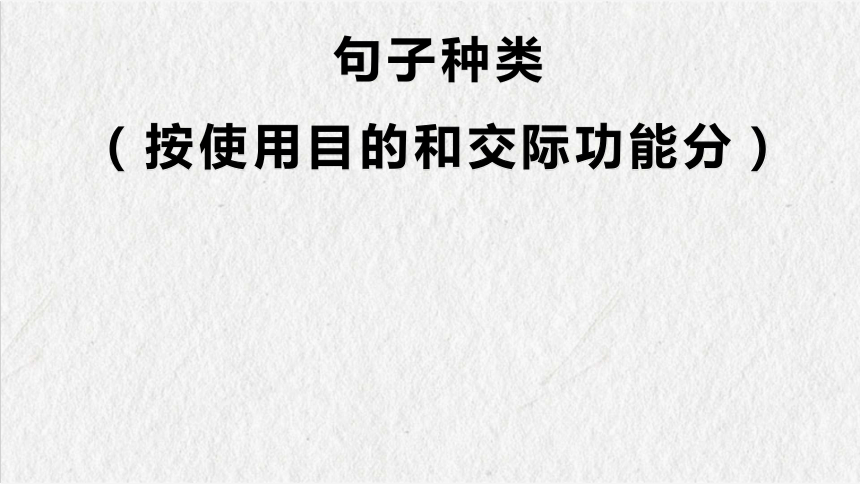(
课件网) 句子种类 (按使用目的和交际功能分) CONTENTS 句子种类 01 习题练习 02 01 句子种类(按使用目的和交际功能分) 一、陈述句 陈述句用来陈述一件事或表达一种看法,有肯定和否定两种形式,句末通常用句号,读降调。陈述句主要分为肯定句和否定句。 1.肯定陈述句 结构:主语+谓语+其他。 That boy often helps others. I went to the cinema yesterday. I like talking with other people. Singing seems easy for me. 2. 否定陈述句 (1)当谓语动词含有be动词、助动词或其他情态动词时,否定形式是在这些动词之后加not。 I can’t sing well. The sweater isn’t made of wool. She can’t be at home, because I saw her boarding yesterday. 2. 否定陈述句 (2)谓语部分是实义动词或含有情态动词have/has/had to时,否定形式在这些动词前加don’t, doesn’t或didn’t。 The boy doesn’t do housework at home. I don’t like talking with other people. We didn’t have a good holiday. 2. 否定陈述句 (3)当have(有)、need(需要)、dare(敢于)作实义动词时候,通常在前面加don’t/doesn’t/didn’t构成否定句。 I don’t have dinner. The bike didn’t need to be repaired. Jim doesn't dare (to) go into the haunted house. 2. 否定陈述句 (4)否定词 用no表示,no=not any/a。 He has no sister.=He doesn’t have any sisters. never绝不,从来不。 I have never seen such a man. little,few几乎没有。 There are few students in the classroom. There is little bread in the kitchen. no one/nobody 没有人。 No one/Nobody is interested in the book. nothing什么也没有。 There is nothing wrong with you. neither of两者都不;none of没有一个(用于三者或三者以上)。Neither of them has ever been to Beijing. seldom 很少,hardly 几乎不。 I can hardly say a word. She seldom listened to me. too……to 太……而不能……。 He was too late to catch the bus. not...at all一点儿也不......。 He didn't care about the result at all. not…any more=no more 不再,再没有。 I can’t believe you any more.= I can no more believe you. not…any longer=no longer 不再,再没有。 I’m not a child any longer.= I’m no longer a child. 复习缩略形式: I am he is she is they are you are there is there are can not =I’m =he’s =she’s =they’re =you’re =there’s =there’re =can’t do not does not is not are not let us will not I will was not =don’t =doesn’t =isn’t =aren’t =let’s =won’t =I’ll =wasn’t 将下面肯定陈述句变成否定陈述句: 1.We go to school on Sunday. We don’t go to school on Sunday. 2.We’ll go to the park this afternoon. We won’t go to the park this afternoon. 3.I am watching TV now. I am not watching TV now. 4.Jack’s father is a teacher. Jack’s father isn’t a teacher. 将下面肯定陈述句变成否定陈述句: 5.The dog runs fast. The dog doesn’t run fast. 6.The baby can speak. The baby can’t speak. 7.There is some water in the bottle. There isn’t any water in the bottle. 8.Her mother works hard. Her mother doesn’t work hard. 将下面肯定陈述句变成否定陈述句: 9.They like reading books. They don’t like reading books. 10.We had lessons this morning. We didn’t have lessons this morning. 11.I have a doll. ... ...

